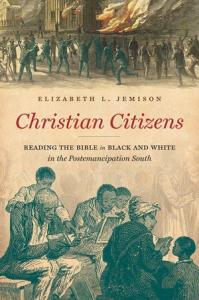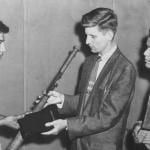Today we welcome Elizabeth Jemison to the Anxious Bench. She is Assistant Professor of Religion at Clemson University and the author of Christian Citizens: Race and Politics in the Post-Emancipation South, published recently by the University of North Carolina Press.
Why discuss “Christianity” and “citizenship” together in a study of the South after the Civil War?
 Early in my research, I noticed that the meanings of both Christian identity and citizenship were hotly debated in the postemancipation South, yet many people across racial and political lines thought the two terms were linked. Black Christians argued forcefully that true Christianity and their U.S citizenship together defended racial equality. Discrimination was sinful and unlawful. White southern Christians, who believed their southern denominations alone represented true Christianity, argued that Christianity and citizenship both mandated obedience to the white male run paternalistic social order. Citizenship – granted to all persons born in the U.S. with the 1870 ratification of the Fourteenth Amendment – did not convey the right to vote, as women’s status as non-voting citizens clearly conveyed. Yet, what Christian identity and behavior entailed was also subject to debate.
Early in my research, I noticed that the meanings of both Christian identity and citizenship were hotly debated in the postemancipation South, yet many people across racial and political lines thought the two terms were linked. Black Christians argued forcefully that true Christianity and their U.S citizenship together defended racial equality. Discrimination was sinful and unlawful. White southern Christians, who believed their southern denominations alone represented true Christianity, argued that Christianity and citizenship both mandated obedience to the white male run paternalistic social order. Citizenship – granted to all persons born in the U.S. with the 1870 ratification of the Fourteenth Amendment – did not convey the right to vote, as women’s status as non-voting citizens clearly conveyed. Yet, what Christian identity and behavior entailed was also subject to debate.
Another way of framing my interest in Christianity and citizenship is my desire to bring together scholarly conversations on the history of American Christianity and on political history of the postemancipation South. I wanted to bring together the careful theological attention that historians of Protestantism have shown with the trenchant analysis of race, gender, and violence that recent work on the postemancipation South has demonstrated.
You maintain that the “paternalistic social order” and the “white family” were central to the way that white southern Protestants contended against black citizenship and civil rights. I often think about the “family” as emerging as a central political concern in the 1970s rather than the 1870s. How did conceptions of the family shape white religious and political thought in the post-Civil War decades?
The white family, as a righteous, male-led structure that deserved protection from church and state, was the centerpiece of antebellum proslavery Christianity, not the invention of the nascent religious right in the 20th century. Justifying slavery as another aspect of the white family, where wives obeyed husbands, children obeyed parents, and enslaved people obeyed masters, fit within white Christian claims that they followed the Bible most faithfully. All four of the New Testament epistolary instructions that slaves obey their masters appeared alongside instructions for wives to obey their husbands. Southern historians, following Stephanie McCurry’s Masters of Small Worlds (1995, OUP), have shown that one of the most powerful tools to justify slavery was to claim that it was as legitimate as marriage, but few religious historians have incorporated this key contribution. Nineteenth-century marriage, with strict legal hierarchy and restriction of women’s rights, was nothing like slavery, but making the case that it was legitimized slavery. Because proslavery Christianity rooted slavery in the godly family and hierarchical household, this theology did not dissolve after emancipation because the legitimacy of white families was at stake.
Proslavery theology did not die with Confederate defeat; it reinvented itself. White southern Christians continued to use the hierarchical white family to argue that God’s design was for white men to govern families, churches, and government – deliberately undermining Black autonomy in religious and political spheres and denying Black families, women, or children the protected status that their white counterparts enjoyed. The durable logic of proslavery theology drove white southern Protestantism throughout the late nineteenth century, justifying white supremacist violence including lynching and legitimizing legal efforts to strip civil and political rights from Black citizens. Although my book ends with the turn of the 20th century, I see resonances of the long-lived logic of proslavery theology from the early fundamentalist movement through our present moment.
“Black and white Christians approached conversion similarly, although they expected different behavior from new converts as Christian citizens.” At points of your book, I wanted to ask you if we really can consider “southern black Protestantism” and “southern white Protestantism” two subspecies of the same religion. Are they more alike, or more different? The two articulations of Christian citizenship are just so divergent. Then, I bump into a statement like the above quote, which reminds me just how many religious beliefs and practices black and white southerners shared. How do we hold those two realities together?
Black and white Protestants from many denominations shared theological beliefs in the authority of the Bible, the need for personal conversion, and the reality of heaven and hell. Black and white Methodists praised John Wesley’s legacy, sang Charles Wesley’s hymns, and recited the Apostle’s Creed. But these theological beliefs did not shape southerners’ actions nearly as strongly as their diametrically opposed ideas of Christian citizenship. Racial identity was a far more powerful predictor of whether someone thought racial discrimination was sinful prejudice or divinely mandated social order.
Even if southern Protestants across racial lines believed they should strive for personal holiness, white southerners generally limited that issues of personal piety like avoiding alcohol but refused to see participating in white supremacist mob violence as sin. To them, such actions were a necessary responsibility for Christian men who needed to defend their family and community. Black Christians found such arguments absurd and dangerous, and they argued that racial prejudice in any form was sinful. They drew on the Apostle Peter’s claim in Acts 10 that “God is no respecter of persons” and argued, like antebellum Black abolitionist David Walker had, that racial prejudice was the modern equivalent of separating Jewish and Gentile followers of Christ in the first century.
I see parallels between this late nineteenth-century story and the contemporary religious and political landscape. Evangelical Christians may claim to be united by a focus on the authority of the Bible, personal conversion, and proselytism, but white evangelicals today are more powerfully united by white supremacy, toxic masculinity, and Christian nationalism – as authors such as Anthea Butler, Kristin Du Mez, and Jemar Tisby are showing us. My book illustrates that the dangerous merging of white supremacy and theological support for male power long predates the late 20th and early 21st century contexts in which we know them best
What was the Colored Methodist Episcopal Church? What was its place on the landscape of African American Protestantism, and what was its distinctive understanding of Christian citizenship?
The Colored Methodist Episcopal Church (which, since the 1950s, has been the Christian Methodist Episcopal Church) was formed in 1870 by formerly enslaved members of the white-run Methodist Episcopal Church, South, with the blessing of white Methodist leaders. The CME Church has been too quickly dismissed as too politically conservative and compromised by its ties to white Southern Methodists. But I don’t think that’s fair.
The CME Church – although always smaller than rivals such as the African Methodist Episcopal (AME) Church – included a range of clergy and lay opinions, many of whom fiercely denounced white Christian hypocrisy. The denomination’s leadership eschewed overt political activism in part because white Southern Methodists promised substantial financial support and donations of church property. Yet when Southern Methodists failed to follow through on the promised aid, CME Church leaders excoriated their paternalistic rhetoric for being devoid of substance.
“Across Mississippi in the fall of 1875, white Christians from many denominations endorsed Democrats’ white supremacist power grab as a return to social order from chaos.” Were there any meaningful fault lines within southern white Protestantism during these decades? Was there monolithic opposition to civil rights and religious endorsements of racial and mob violence? Does it make a difference to the story if we add in Holiness Wesleyans or other groups?
One of the things that surprised me as I researched the book was how very similarly white Christians across meaningful theological divides united around the same white supremacist goals. Take two of the ministers I mention in chapter three (the chapter you quote in your question), Presbyterian Rev. Samuel Agnew and Methodist Rev. John G. Jones. Agnew was a deeply committed Calvinist who spent his evenings reading treatises on predestination and the absurdities of Arminian theology. Jones was an archetypal Methodist – a former circuit rider who by the 1870s had been appointed by his colleagues to write a history of Methodism in Mississippi. These two men both strongly endorsed Democratic victories in the state’s violent 1875 elections as well as the means by which Black voters were threatened to stay away from the polls. Even white Christians who would have refused to celebrate the sacrament of communion together shared the same vision of white supremacist political control as a Christian necessity.
Your question reminds me of one that some readers have asked, “But what about the good white folks? Why don’t you write about them?” That question – invariably from white Christian readers – points to how deeply engrained a vision of white racial innocence is in this country, even if it is categorically false. My book works to tell part of the story of how this dangerous “race-blind” vision of white Christianity came to be, how deeply embedded it has been in white supremacist political structures, and how fully it was denounced by Black Christians all along the way.
“White southerners worshipped white supremacy more faithfully than Christianity.” That statement reminds me of Albert Raboteau’s insistence that African American Christians were martyrs and white slave-owning or slavery-defending Christians were heretics. In the pages of your book, many southern black Protestants articulate versions of that argument. Is that your conclusion?
The historical evidence is clear that defending white supremacy was a central goal for white southern Protestants in these years. They argued after emancipation that the Bible legitimized slavery, justified white supremacist violence to achieve white political power, used church yards as lynching sites, and prayed for God’s help in depriving Black men of the right to vote, all while insisting that they alone were true Christians who took the Bible seriously.
But my book goes beyond simply pointing these things out to show that Black Christians consistently denounced white supremacist Christian claims as heresy. They crafted stinging attacks that used the Bible, much as antebellum Black abolitionists had, to argue against all racial hierarchy as Christian heresy. Rather than offering my own theological analysis, I’m interested in elevating the Black voices that did that work more than a century ago. Theologically-minded white Christian readers might do well to listen to Black voices past and present if they want to understand the depth of white supremacy in their own tradition.
Thanks, Elizabeth!













